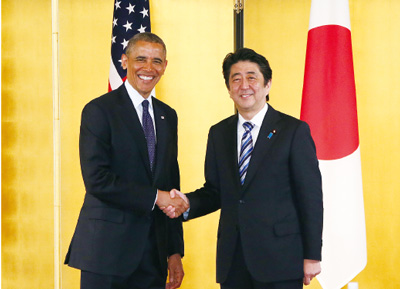Diplomatic Bluebook 2015
Chapter 2
Japan’s Foreign Policy that Takes a Panoramic Perspective of the World Map
Section 2 North America
Overview
United States
Japan and the United States are allies sharing fundamental values and strategic interests. The Japan-U.S. Alliance is the linchpin of Japan’s diplomacy and security, and plays an important role in maintaining the stability and prosperity not only of the Asia-Pacific region but also of the whole world. Japan welcomes the United States’ rebalancing toward the Asia-Pacific as it contributes to the stability and prosperity of the region. The two countries will cooperate closely in order to play a leading role in creating order in the region.
In April 2014, U.S. President Barack Obama made the first state visit to Japan by a U.S. President in 18 years. On the occasion of this visit, the Japanese and U.S. leaders issued the U.S.-Japan Joint Statement. In the Joint Statement, the leaders praised and welcomed respective policies – Japan’s “Proactive Contribution to Peace” and the U.S. rebalancing toward the Asia-Pacific, noting that both contribute to the peace and stability of the region, and affirmed the Japan-U.S. Alliance’s leading role in ensuring a peaceful and prosperous Asia-Pacific. In the annex to the Joint Statement, “Leaders Statement on U.S.-Japan Bilateral Exchanges,” the two leaders identified the broad people-to-people exchange between Japan and the United States as a key pillar of the Japan-U.S. Alliance.
 President Obama and Prime Minister Abe at the Japan-U.S. summit meeting (April 24, Tokyo; Source: Cabinet Public Relations Office)
President Obama and Prime Minister Abe at the Japan-U.S. summit meeting (April 24, Tokyo; Source: Cabinet Public Relations Office)
In 2014, close communication was maintained between Japanese and U.S. dignitaries: In addition to President Obama’s visit to Japan, a Japan-U.S. Summit Meeting was held on the margins of the Group of Twenty (G20) Summit, and a Japan-U.S. foreign ministers’ meeting was held on four occasions. Through these opportunities, Japan and the United States made a strong impression that they will work together in the Asia-Pacific region and jointly address urgent challenges facing the international community by close cooperation in tackling global issues such as the Islamic State of Iraq and the Levant (ISIL) and the Ebola virus disease outbreak.
Canada
Japan and Canada are closely cooperating together on a wide range of fields including politics, economy, security and culture, as partners in the Asia-Pacific region, sharing fundamental values and as members of the Group of Seven (G7).
Prime Minister Shinzo Abe and Canadian Prime Minister Stephen Harper held summit meetings in March and November 2014. The leaders exchanged views on bilateral relations including the Japan-Canada Economic Partnership Agreement (EPA) and the project to export Liquefied Natural Gas (LNG) to Japan from Canada, and the international situation. In July, Canadian Foreign Minister John Baird visited Japan. The Minister Baird held a foreign ministers’ meeting with Foreign Minister Fumio Kishida and paid a courtesy call on Chief Cabinet Secretary Yoshihide Suga. The two sides affirmed the importance of promoting cooperation in wide-ranging areas including politics, security, economy and people-to-people exchanges.
